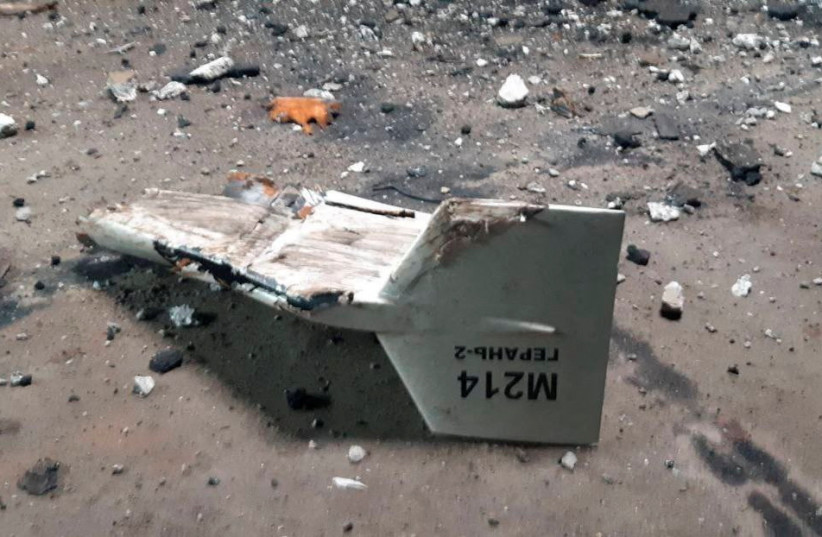With Russia’s increasing use of Iranian drones and other weapons in its continued assault on Ukraine, there is, once again, talk about whether Israel should be getting involved in the war.
Ukrainian Foreign Minister Dmytro Kuleba on Tuesday said his country “will send an official note to the government of Israel with a request to urgently provide Ukraine with anti-aircraft systems and to start high-quality cooperation on obtaining appropriate technologies for Ukraine.”
“Iran is a red line for Israel, and after Iran has directly, in fact, become complicit in the crime of aggression against Ukraine, I think anyone in Israel who still has any hesitation about whether or not to help Ukraine, he must dispel these hesitations,” he added.
Days earlier, a tweet from Diaspora Affairs Minister Nachman Shai caused quite an uproar.
“This morning it was reported that Iran is transferring ballistic missiles to Russia,” he wrote Sunday. “There is no longer any doubt where Israel should stand in this bloody conflict. The time has come for Ukraine to receive military aid as well, just as the USA and NATO countries provide.”
While Ukrainian diplomatic sources hoped that Shai’s statement marked a shift in Jerusalem’s stance toward aiding their war effort, at least one prominent Russian responded furiously.
<br>Russia and Ukraine on idea of more Israeli involvement
Former Russian president Dmitry Medvedev warned on his popular Telegram channel: “It looks like Israel is going to provide arms to the regime in Kyiv. A very reckless move. It will destroy government relations between our countries.”

People take the title “minister” seriously, and non-Israelis often expect a level of message discipline that doesn’t really exist in Israel. In reality, Shai is not a member of the security cabinet, nor is he a realistic candidate to return to the Knesset after the election in two weeks. He is the only member of the broader cabinet who has publicly called for military aid to Ukraine, though others – including Prime Minister Yair Lapid while he was foreign minister – have done so behind closed doors. One tweet does not reflect a policy shift.
There have been reports in The New York Times and other outlets that Jerusalem is more involved than initially, sharing intelligence with Kyiv about Iranian drones, allowing tech firms to work in Ukraine against UAVs and turning a blind eye to third countries’ intentions to transfer Israeli weapons that they purchased to Ukraine.
Ukrainian Ambassador to Israel Yevgen Korniychuk was encouraged by Shai’s tweet, but he said there has been no detectable shift in Israel’s position since Iranian arms were turned against his country. The reports on intelligence sharing are “conspiracy theories,” he said Tuesday.
Ukrainian President Volodymyr Zelensky “expected more when Iran proved to be helping Russia, but we are disappointed,” Korniychuk said.
“We are talking just about defensive weapons, not offensive,” he said. “This is critical for us right now, not in three months or six months. We appreciate Lapid’s condemnations, but we need more than words to defend our civilians.”
Where does Israel stand on Russia-Ukraine War
Israel has expressed opposition to Russia’s invasion of Ukraine from the start, consistently voting against it in the UN, and it has provided significant humanitarian aid to Kyiv, including a field hospital. Earlier this month, Lapid condemned Russian strikes on civilians.
However, Israel has declined to provide any military aid beyond vests and helmets to Ukraine. This is in part out of a concern for maintaining the deconfliction mechanism in place between Israel and Russia, which allows Israel to attack Iranian targets in Syria, even though Russia has sharply reduced the number of soldiers it has stationed in Syria.
Israel is also concerned for the well-being of Russian Jews, a worry that has continued to be justified by the Russian authorities’ behavior, such as cracking down on the Jewish Agency, pressuring rabbis to express support for the war and the general ban on adult men from leaving the country in light of the more recent conscription order.
Until recently, Israel’s concerns about its own interests and those of the Diaspora came before Ukraine and being a member in good standing of the Western alliance against Russia.
But now, Iranian drones and other arms are being battle-tested in Ukraine, and Tehran, which has a professed mission to destroy the Jewish state, could use that experience and knowledge to more effectively combat Israel. After all, it’s already doing that through its proxies, such as Hezbollah, and attacking Israeli allies in the Gulf, including the UAE, with its drones.
Will Israel's involvement in Russia-Ukraine War change?
There is a clear security interest in Israel getting more involved – fast – and allowing its anti-missile and drone technologies to be used against Iran’s.
Meanwhile, Lapid has been quiet on the matter, with his office declining to comment on Kuleba’s appeal. Opposition leader Benjamin Netanyahu, who has advocated for a more neutral stance on the war, warned in an interview with MSNBC that “weapons that we supplied in one battlefield [could] end up in Iranian hands used against us.”
The question remains whether Jerusalem will start to consider helping Ukraine to be in the interest of Israel’s national security, or will it continue behaving the way it has since the war began – regardless of the dramatic shift involving Iran.